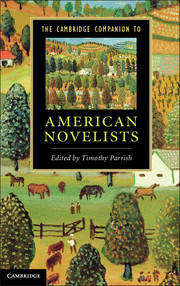Book contents
- Frontmatter
- Contents
- Contributors
- Introduction
- 1 James Fenimore Cooper
- 2 Nathaniel Hawthorne
- 3 Herman Melville
- 4 Harriet Beecher Stowe
- 5 Mark Twain
- 6 Henry James
- 7 Edith Wharton
- 8 Theodore Dreiser
- 9 Willa Cather
- 10 F. Scott Fitzgerald
- 11 Ernest Hemingway
- 12 William Faulkner
- 13 Henry Roth
- 14 Djuna Barnes
- 15 Zora Neale Hurston
- 16 Richard Wright
- 17 Raymond Chandler
- 18 Ralph Ellison
- 19 J. D. Salinger
- 20 Patricia Highsmith
- 21 Vladimir Nabokov
- 22 Jack Kerouac
- 23 Saul Bellow
- 24 Kurt Vonnegut
- 25 John Updike
- 26 Thomas Pynchon
- 27 Toni Morrison
- 28 Philip Roth
- 29 Don DeLillo
- 30 Cormac McCarthy
- Guide to Further Reading
- Index
- References
4 - Harriet Beecher Stowe
Published online by Cambridge University Press: 05 December 2012
- Frontmatter
- Contents
- Contributors
- Introduction
- 1 James Fenimore Cooper
- 2 Nathaniel Hawthorne
- 3 Herman Melville
- 4 Harriet Beecher Stowe
- 5 Mark Twain
- 6 Henry James
- 7 Edith Wharton
- 8 Theodore Dreiser
- 9 Willa Cather
- 10 F. Scott Fitzgerald
- 11 Ernest Hemingway
- 12 William Faulkner
- 13 Henry Roth
- 14 Djuna Barnes
- 15 Zora Neale Hurston
- 16 Richard Wright
- 17 Raymond Chandler
- 18 Ralph Ellison
- 19 J. D. Salinger
- 20 Patricia Highsmith
- 21 Vladimir Nabokov
- 22 Jack Kerouac
- 23 Saul Bellow
- 24 Kurt Vonnegut
- 25 John Updike
- 26 Thomas Pynchon
- 27 Toni Morrison
- 28 Philip Roth
- 29 Don DeLillo
- 30 Cormac McCarthy
- Guide to Further Reading
- Index
- References
Summary
In April 1857, Maryland authorities arrested Samuel Green, a free African-American minister, charging him with two crimes: first, possessing a map of Canada, a railroad schedule to Canada, and letters Green’s son had written from Canada; second, “knowingly having in his possession a certain abolition pamphlet called ‘Uncle Tom’s Cabin’ or ‘life among the lowly.’” These items, according to the indictment, were “of an inflammatory character calculated to create discontent amongst the colored population of this State.” Although the court concluded that the letter, map, and railroad schedule were not conclusive proof of Green’s intention to help slaves escape, it ruled that Green’s possession of Uncle Tom’s Cabin was clearly a crime. In May, Green was sentenced to ten years in the Maryland State Penitentiary for having a copy of Harriet Beecher Stowe’s (1811–96) novel. Uncle Tom’s Cabin (1852) was never merely phenomenally popular; it was fundamentally dangerous.
The novel remains dangerous. If at one time Uncle Tom’s Cabin was thought to be the single most powerful instrument for destroying slavery – an understanding illustrated by Abraham Lincoln’s notorious yet apocryphal comment upon meeting Stowe: “So you’re the little woman who wrote the book that made this great war” – more recently, readers have regarded the novel as an insidious mechanism for solidifying demeaning stereotypes about African Americans (a position crystallized by the way that the incendiary epithet Uncle Tom has become shorthand for the cowardly obsequiousness of a race traitor). As one critic has rather dramatically declared, “The devil himself could have forged no shrewder weapon” to oppress African Americans than Uncle Tom’s Cabin.
- Type
- Chapter
- Information
- The Cambridge Companion to American Novelists , pp. 32 - 41Publisher: Cambridge University PressPrint publication year: 2012



